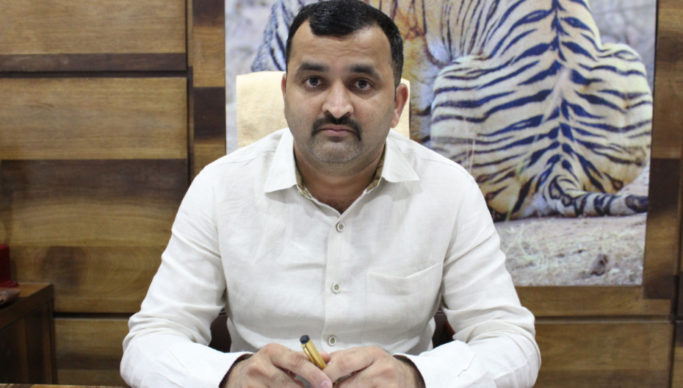
Interview with Santosh Kank
INTERVIEW
FOREST DEPARTMENT
‘Love Animals and Wild Birds But Do Not Make Them Hostages’
In the quest for rapid urbanisation and for agricultural purposes, our forests are vanishing at an alarming rate. Besides pollution,hunting and climatic change are also dangerous factors. Yet,the Forest Department has hastened the campaign to save wildlife and protect the forest and safeguard the freedom of the wild animals from the clutches of the people. Under the Wildlife Protection Act,we cannot keep any birds or animals that live in the forestsin our homes. For example,we cannot keep our national bird in our homes.The same rules apply for other wild animals.Yet,there are some people who are unaware to these rules and there are people who deliberately hunt wild animals or even smuggle their body parts. The increasing human population is becoming the biggest threat to our wildlife. In this regard, Home Times(HT) spoke to Mumbai Range Forest Officer,Santosh Kank (SK)to enlighten our readers of the little
-known facts of the Forest Department and their endeavours in keeping our forests encroachment-free and protecting our wildlife. After all, our forests are the habitat of wildlife and not of encroachers and poachers. Read on…
HT: In our daily lives, we often hear about the Police Department, Fire Department, doctors,etc.,but there is very little information about the Forest Department.
SK: The Maharashtra Forest Department has started a Helpline 1926 a year ago.The calls come from various corners of Maharashtra.If any complaint is related to the Forest Department, it is immediately registered. After it is registered,it is solved within 24 hours. In this way,slowly but surely, the Forest Department is reaching out to the common man. Due to our Helpline number many people have been benefitted. In my region in Mumbai,I get around 4 to 5 calls in a day with reasons like monkeys being seen in the premises or they have spotted a snake.They call us to rescuethem.
HT: As the area of Mumbai is closer to the forest, more calls come from there. Then how do you people reach others? Have you started a campaign to make them aware?
SK: We have awareness programmes for such people and also with the Forest Department, Mumbaikars and NGOs make people aware about this Helpline. In addition, we have a team of Wildlife officials which includes Pawan Sharma, Sunish Kunju and Mayur Kamat who also take up awareness programmes in their own way. At Aarey Colony, the highest number of awareness programmes are undertaken once a month to teach the locals how to defend themselves against wild animals.
HT: How many sectors are there in the Forest Department and what is the nature of your work?
SK:There is a separate sector in the Forest Department of Mumbai, which has the Mangroves Department, the Wildlife Department and the Tertiary Department. Of these, the Tertiary Department and the Mangroves Department protect their land, preventing encroachment on them, while the Wildlife Department protects all the animals in the National Park.
HT:Nowadays, wild animals are increasingly moving in the direction of the city due to which citizens and wild animals are becoming enemies of each other. What is your view on this?
SK: Wherever the wild animals live, human beings are slowly encroaching upon their habitat, due to which they are also now moving towards the cities. It has increased more so in the last 4-5 years that wild animals appear in the city. It was mostly seen in the Aarey Colony area that humans and leopards used to come face to face,but now it has decreased. The phone calls do come from those who spot a leopard,but now they do not become hyper.
HT: If you talk about leopards, sometimes they are captured on CCTV when the leopards are seen moving in some area. When people are scared, then what do you do?
SK: Two or three months ago a leopard appeared in a CCTV footage in Mulund and Pada.People had complained that a leopard was seen. We had informed the team who had done the awareness programme at that place that you had installed CCTV cameras and that is the reason you spotted a leopard. Before the installation of the CCTV cameras,the leopard used to roam in these areas, but the people were not aware. We had also informed the people not to venture out of their homes if they spot a leopard. They should carry their children on their shoulders and not to leave them alone or unattended. When going out it is advised to play loud music on your mobile to keep wild animals at bay.
HT:Even after creating awareness, there is fear amongst the people in some places that if leopardcomes out they would not become victims of a leopard attack?
SK: First of all, a leopard remains around the forest for hunting and its main target is dogs which it pursues. When the dog escapes,the leopard goes astray and enters housing societies.Intentionally, a leopard won’t attack any person as it is itself scared of humans.
HT: The reason that wild animals are seen near human settlements is due to the human encroachment in their natural habitat or there is some other cause, too?
SK: if we talk about the monkeys in Mumbai you will finda majority of them on the trees.As people believe them to beLord Hanuman’s Avtar, people feed these monkeys. One thing that people do not understand is that, once you start feeding these monkeys, they will come daily for food and if they do not get food they will harm the people.That is when people complain about the monkeys causing mischief. We try to make them understand that they should not feed the monkeys.If they do not get food to eat, eventually, they will run away and won’t come back.
HT: Tell us about your duty and what are the main highlights of your work?
SK:We do have a lot of wildlife work.For example, if a bird is injured we rescue it and treat the bird.There are times when people illegally hold wild animals at their homes.In such cases, we arrest them and investigate the matter. Recently, we got a tip about a man who had a turtle.We filed a FIR against him.
HT: What about the animals and body skins that are being smuggled right now?
SK: Now the cases of smuggling have increased.People are smuggling through Facebook and WhatsApp. A wild cat was caught in Thane, which was later sent back to the jungle after treatment. Similarly, a youth at Dadar station was selling mountain parrots and was caught in a trap laid by us. Since the shutdown of Crawford Market, people do trading of these animals and birds via WhatsApp and try selling them.We are keeping a tight vigil on these traders.
HT: Nowadays, people have a craze for keeping turtles and parrots as pets?
SK: Many people in Mumbai keep the parrots in the cage, which is wrong.If someone notices something like this, then they should immediately call on 1926 and inform us. Today, people also keep turtles as their pets, which is illegal. The Indian turtles are banned to be kept as pets.If you find a Star turtle in someone’s house, then there is a penalty of Rs. 25,000 and if Schedule I or Schedule II turtles are found, then we can take the owner to court.
HT: How many people have been attacked by animals and leopards and has the government provided any financial aid to them?
SK:There has been human encroachment at Sanjay Gandhi National Park. 19 persons have been fatally attacked from 2004 to Jan.13,2018, whereas 16 persons have been grievously injured. The govt. has given compensation of Rs.21 Lacs to the next of kin of the deceased.
HT: What message would you like to give to the people?
SK: I want to senda message through your Publication to the citizens that, be it an animal or a wild bird, do not keep it in the house.It is a criminal offence. Love them but do not make them hostages.



